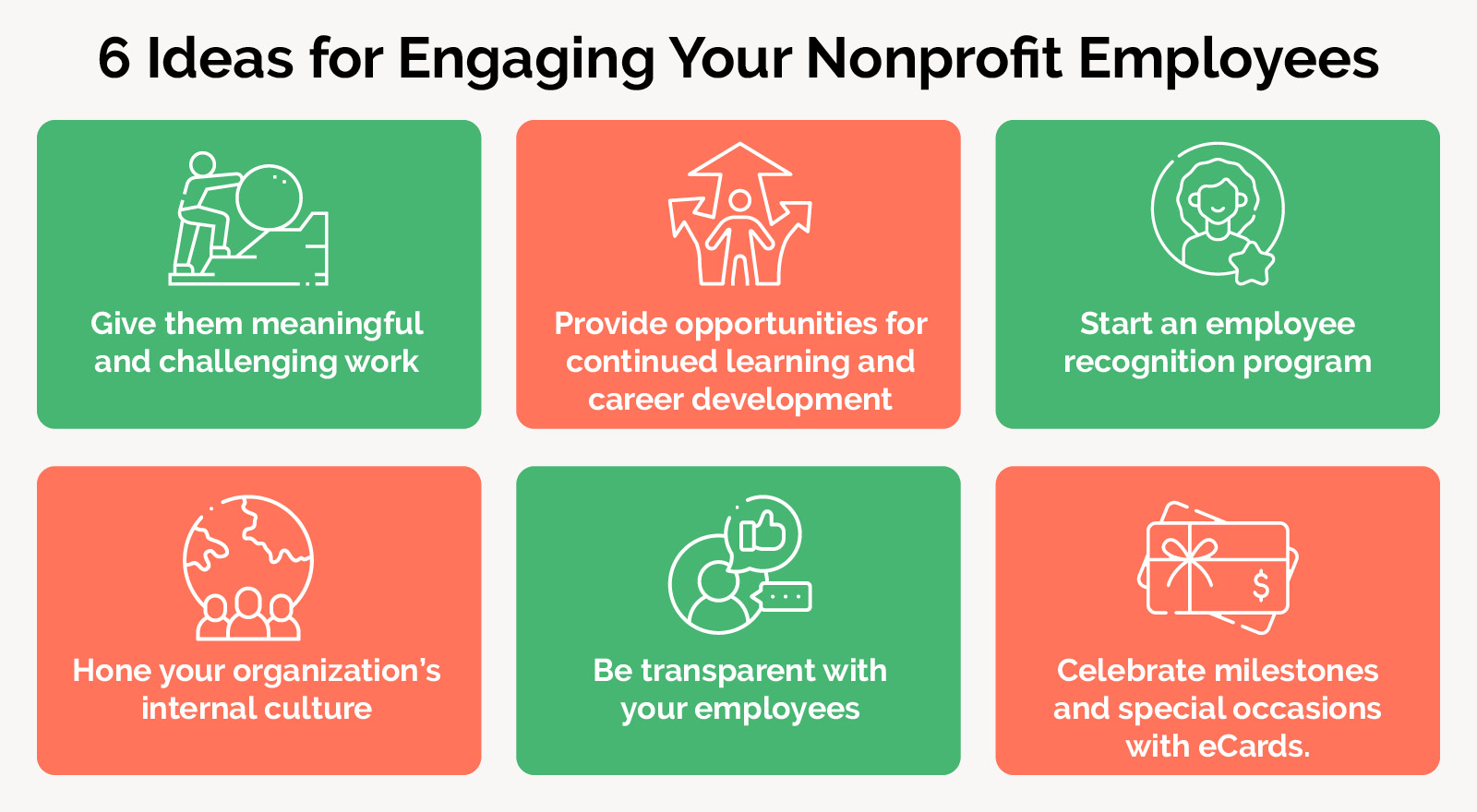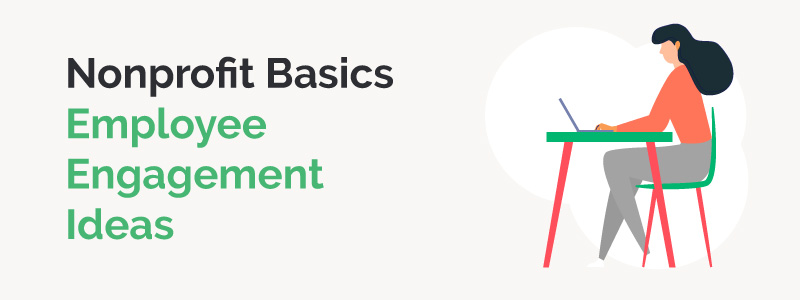Nonprofit Basics: Employee Engagement Ideas
As a mission-driven organization, it’s important for your nonprofit to have employees that are invested in and passionate about their work. In other words, it’s critical to the nature of nonprofit work to have engaged employees who want to drive your mission forward and deliver results for your beneficiaries.
While that might seem obvious, it is a little easier said than done. According to Gallup, only 36% of U.S. employees are engaged at work. Nonprofits face unique challenges when it comes to employee engagement, not the least of which is that they have to compete with the for-profit sector for talent and often have limited resources to work with when honing the employee experience. Actively pursuing ways to engage your employees can help with this issue.
What is nonprofit employee engagement?
Employee engagement refers to how your employees feel about their jobs and how invested they are in your organization’s larger goals. Engaged employees are passionate about their work, enjoy their jobs, and feel satisfied with how they are valued and compensated for their efforts. They’re also very loyal to the organizations they work for and are more likely to stay retained in their roles.
Fostering employee engagement and overall satisfaction is an important part of nonprofit HR, which manages all aspects of the employee lifecycle. From recruiting to exit interviews, keeping the entire employee experience in mind can help you strategize to come up with employee engagement ideas that boost employee retention and help you meet employee needs.
6 Ideas for Engaging Your Nonprofit Employees
Nonprofit employee engagement is essential for building up a strong internal team that can drive your mission forward. These ideas can help you fine-tune your own organization’s strategy:

Give Them Meaningful and Challenging Work.
Menial, repetitive tasks aren’t fun for anyone. Employees should be doing meaningful work that challenges them and helps them tap into their strengths and build new skills. Employees won’t be innovative and excited about their work if they feel their skills are undervalued or that they aren’t really contributing to a larger purpose.
Make sure you give them meaningful work that puts their skills to use. They’ll feel much more fulfilled this way!
Provide Opportunities For Continued Learning And Career Development.
Employees don’t want a stagnant experience at your organization. To encourage continued growth, provide them with opportunities to do things like:
- Go to conferences
- Join professional organizations
- Continue their education in other ways, such as through certification courses
- Practice their skills by volunteering
There should also be a clear-cut path for career development and growth so that employees know how they can advance in their roles. For example, employees should have access to knowledge about how they could pursue becoming a manager or director and feel able to discuss those opportunities with their manager.
Start An Employee Recognition Program.
An employee recognition program sets up a formal framework for acknowledging staff members for their work and accomplishments. Implementing these programs shows your employees that you see the hard work they’re doing on your nonprofit’s behalf. Some common examples of these programs include:
- Employee of the month. For this recognition program, you’ll highlight your top performer every month. You can make this announcement in a company-wide meeting and present the top performer with a trophy and a gift.
- Structured bonuses. Recognize hard workers by compensating them for their efforts. Select a few performance metrics for evaluating your employees. Set a threshold for that metric, and give bonuses to employees who meet and exceed that threshold. For example, for roles in sales, you could reward employees who’ve sold over $100,000 of products in the past year.
- Loyalty awards. Recognize employees who have been employed at your company for certain durations of time. For example, you can recognize employees on their one-year work anniversary, five-year anniversary, and ten-year anniversary.
- Peer-to-peer appreciation. Foster a more positive work environment by prioritizing peer-to-peer appreciation. Encourage employees to recognize each others’ hard work and contributions. This visibility will create an atmosphere that will empower employees to give you their best work.
Regularly recognizing employees’ accomplishments and progress lets them know you’re paying attention and value their hard work. Plus, don’t forget to appreciate your remote employees as well. Since these staff members work virtually, it’s easy for them to feel disconnected from the workplace. Implementing a recognition program for them can make them feel more engaged in their jobs and help them form connections with other employees.
Celebrate Milestones and Special Days With eCards.

Recognizing milestones and reaching out on special occasions communicates that you care about employees beyond their day-to-day work at your company. From celebrating anniversaries to spreading cheer during the holidays, online greeting cards have so many great uses, which is why they make the perfect addition to your employee engagement program.
Not to mention, they’re incredibly low-cost, so this initiative won’t take much to fund. Here are some special occasions that you might celebrate for your employees:
- Birthdays: Say “happy birthday” to your employees, letting them know you’re thinking of them on their special day.
- Work anniversaries: Show appreciation for employees’ dedication to your company by recognizing their work anniversaries.
- Promotions or achievements: Send congratulatory eCards to celebrate employees’ promotions, achievements, or milestones in their professional growth.
- Holidays: Spread joy by sending eCards to employees during holidays like Christmas, New Year, Thanksgiving, or other cultural and religious celebrations.
- Personal milestones: Commemorate important personal milestones for individual employees, such as marriages, births, graduations, or other significant life events, with eCards that convey warm wishes and congratulations.
Create work eCard designs for different occasions like these. Then, personalize the message you send with each one. Employees will feel appreciated and engaged in no time!
Hone Your Organization’s Internal Culture.
Liven up your work atmosphere and make sure employees have fun. Encourage employees to get to know their coworkers by hosting parties and events. Surprise your employees with fun perks to make them feel appreciated.
Cultivate an atmosphere of positivity and openness so that concerns don’t fester and employees are comfortable in their work environment.
Be Transparent With Your Employees.
Being honest about the good and the not-so-good will show your employees that you see them as valuable team members that should be included in organizational happenings. Show your employees that you care about them by addressing issues honestly and focusing on solutions for moving forward.
If employees feel like they can bring up issues with management, then you’re more likely to catch potential problems before they’ve fully evolved. Not to mention, employees who feel cared for are more likely to care about their work.
Other Resources to Explore
Nonprofit Basics – Learn more about nonprofit management essentials by exploring other expert resources.
Working With a Nonprofit Human Resources Consultant – An HR consultant can provide a third-party perspective on how your nonprofit handles employee relationships and help you to improve. Learn more in this guide.
Compensation Consulting: The Ultimate Guide (+ Top Firms!) – Compensation affects employee satisfaction. Working with a compensation consultant is a great option for nonprofits looking to hone their approach. Start exploring these recommendations!


